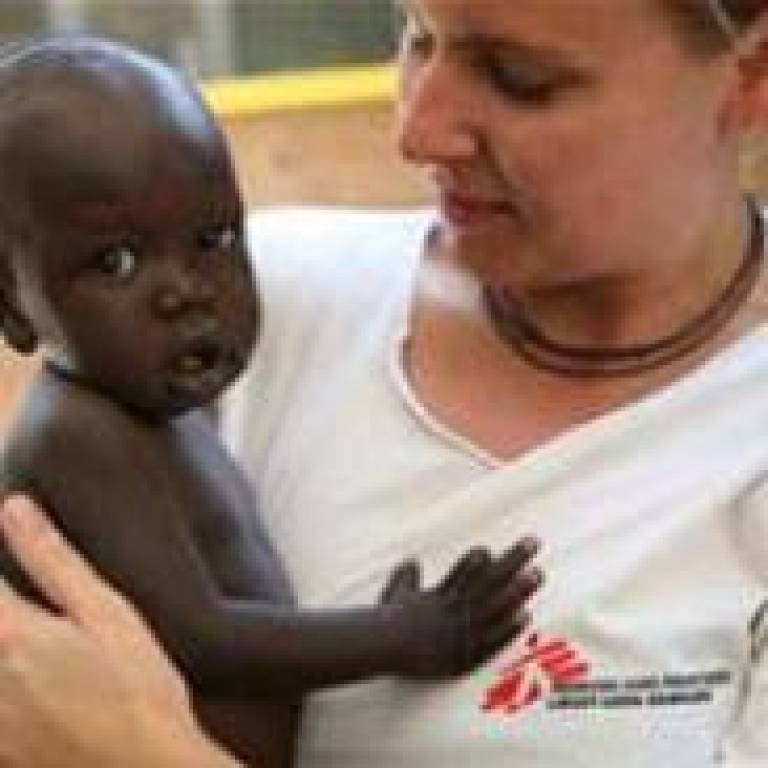What can students really do for global health?
6 October 2010
Links:
 msf.org.uk/" target="_self">UCLU Friends of MSF
msf.org.uk/" target="_self">UCLU Friends of MSF
On 14 October the UCLU Friends of Médecins Sans Frontières Society is holding a panel symposium and drinks reception featuring key figures from the field of global health.
Here Alisha Allana (UCL Biosciences), President of the society, explains UCL Union's relationship with Médecins Sans Frontières (MSF) and how students from all disciplines can play an active part.
"As students, we have the energy, the convictions and plenty of free time to positively influence the health of the world, but it can be difficult to know how to do it. Student initiatives can achieve tangible, positive change. Here at UCL, awareness and money have been raised for development in conflict areas (2009 Darfur Week campaign) to redesign and rebuild a school in Haiti ('Thinking Development') and to successfully campaign for the creation of a patent pool for HIV drugs (Universities Allied for Essential Medicines campaign).
But we must be careful, for it is very easy for well intentioned schemes to be - to borrow a phrase from Paul Collier (Director of the Centre for the Study of African Economies, Oxford University) - 'more heart than head'. The first step in avoiding this is educating ourselves as much as possible; that is, after all, our primary role as students. To that end, we have assembled some of the world leaders in global health to give you some answers to the difficult question: what can students really do for global health?
The event brings together a number of UCL Union societies: organised by UCLU Friends of Médecins Sans Frontières and RUMS MedSIN, supported by a UCL Friends' Trust grant, and in association with the UCL Institute of Global Health, the Global Development Initiative and UCLU Engineers Without Borders. As student societies, our aim is to promote understanding and awareness of current issues worldwide, from encouraging students to write for the MedSIN magazine Perspectives, to holding speaker events and workshops where MSF field workers share their personal experiences.
Whilst recognising the importance of global health education, we also aim to raise money for 'Médecins Sans Frontières', otherwise known as 'Doctors without Borders': the medical and humanitarian international aid organisation dedicated to providing healthcare access in areas where it is most needed. In the past, UCLU Friends of MSF have raised thousands of pounds for this worthwhile cause through events such as the annual MSF Fun Run in Regent's Park, Battle of the Bands and Dance for Change. It is the enthusiasm and motivation of the students that makes our events as successful as they are.
Despite the assumption that we primarily target medics, students from all disciplines have always been keen to take part in our events: engineers, architects, geographers and historians, to name but a few. This illustrates the fact that all students can get involved and make a difference; many students have the incentive and desire to do so, hence our reason for organising this event, which will provide some answers to the question we began with: what can students do for global health?"
For more information, please email the UCLU Friends of MSF.
Event details
Date: 14/10/2010
Time: 7.15pm
Venue: Christopher Ingold Auditorium (Chemistry Building)
This event is free to attend and open to all. It will be followed by a free drinks reception in the North Cloisters.
Guest panel
Professor Anthony Costello, Chair
Anthony Costello is a Professor of International Child Health and Honorary Consultant Paediatrician at Great Ormond Street Hospital. Professor Costello is also the current Director of the UCL Institute for Global Health.
Professor Heymann is Chairman of the UK Health Protection Agency Board, and Head of the Centre on Global Health Security at Chatham House.
Dr Wong is on the MSF UK Board of Directors.
Nina Neeteson works for Engineers Without Borders and has also worked for Article 25, a construction non-governmental organisation, and was involved in several youth-led campaigns for transparency in the international development programmes of donor governments.
Dr Jonny Currie
Dr Currie is a recently qualified doctor. During his time as a medical student, he was the national co-ordinator of MedSIN UK and the editor of The Lancet Student.
Image: A young girl with an MSF nurse in a therapeutic feeding centre, south Sudan
Related news
UCL Friends of
MSF 2010 charity run
 Close
Close

